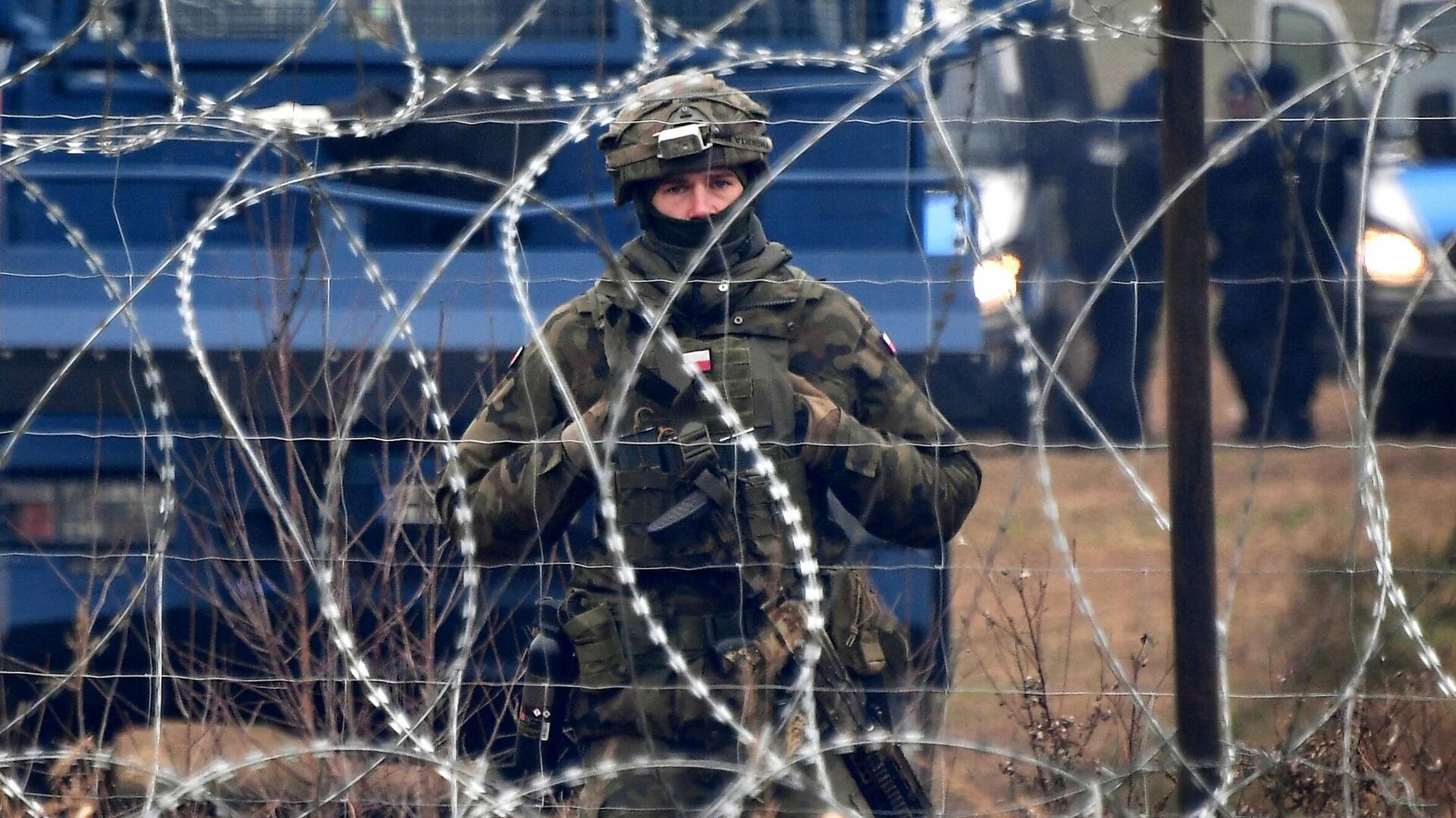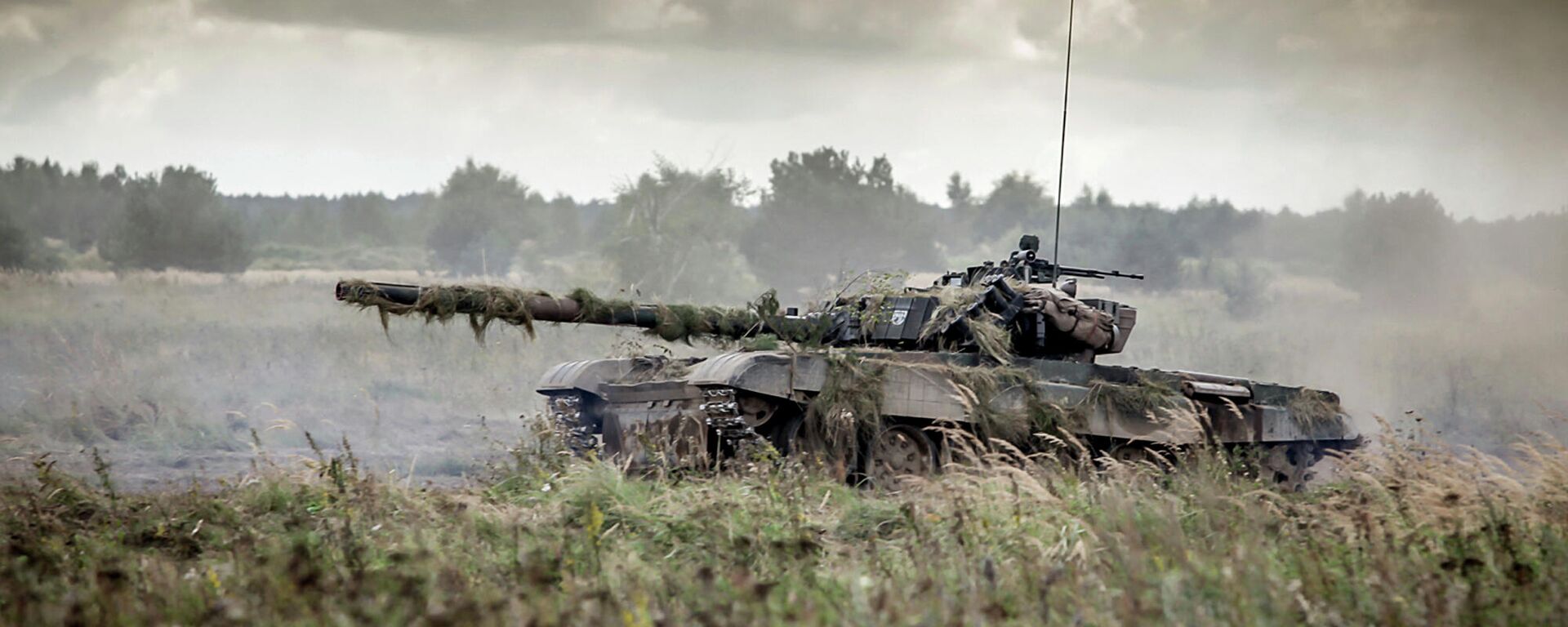https://sputnikglobe.com/20240406/poland-raises-fears-of-evil-russian-empire-as-pretext-for-frantic-militarization-1117782852.html
Poland Raises Fears of 'Evil Russian Empire' as Pretext for Frantic Militarization
Poland Raises Fears of 'Evil Russian Empire' as Pretext for Frantic Militarization
Sputnik International
Military aviation was up in the air on high alert on Saturday morning in response to “the actions of Russian aviation in Ukraine,” the commanders of Polish air force posted on the X network.
2024-04-06T16:59+0000
2024-04-06T16:59+0000
2024-04-06T16:59+0000
poland
ukraine
russia
radoslaw sikorski
donald tusk
nato
https://cdn1.img.sputnikglobe.com/img/07e5/0b/0c/1090689409_0:0:2354:1324_1920x0_80_0_0_f919541fd14a3ff6ea5e71570975be5c.jpg
Poland's anti-Russia rhetoric is escalating, as Warsaw is stocking up on weapons, raising concerns about Polish authorities preparing for direct military confrontation with Moscow.The country’s Prime Minister Donald Tusk even went as far as to say that Poland was in a “pre-war state” with Russia and that the Russian president Putin might use the terrorist attack against Crocus City Hall as a pretext to escalate.“We know from history that Putin uses such tragedies for his own purposes,” Tusk was quoted by the American channel CNN World as saying.Polish Foreign Minister Radoslaw Sikorski sent shock waves through the media this week by declaring in Brussels that NATO was setting up a “special mission” in Ukraine.Sikorski was already on record for making an equally provocative statement in mid-March that “NATO forces are already in Ukraine, and this is not a secret to anyone.”Asked by journalists if NATO had already crossed Russia’s “red line” — Moscow said it would consider NATO soldiers in Ukraine legitimate targets — Sikorski hid behind ambiguity on both occasions.On Friday, Polish Defense Minister Władysław Kosiniak-Kamysz revealed that he visits Poland’s eastern border almost every day. Earlier he claimed that “Russia is rebuilding the evil empire” as the reason for tensions on the frontiers with Russia’s Kaliningrad region, Belarus and Ukraine.Leading Polish weekly Polityka called the use of “strategic ambiguity” by Sikorski dangerous, because “he sounded like someone announcing the deployment in Ukraine of a military contingent of NATO.” It noted that such unhinged statements could be made to justify massive purchases of weapons abroad, which literally “drain the country of all resources still left here.”Another Polish weekly, Do Rzeczy, wisely questioned Warsaw's ability to pay for the military reforms that are expected to make Poland’s army “the strongest in Europe” in just a few years. Last year alone, Poland bought 32 F-35A fighter jets and 366 Abrams tanks from the US. Warsaw also ordered 1,000 K2 tanks in South Korea along with 673 self-propelled howitzers. From the US, 96 Apache helicopter gunships and 486 HIMARS multiple launch rocket systems will be delivered onto Polish soil in coming years.All in all, between 2022 and 2035, Warsaw plans to spend over $164 billion of taxpayers' money on weapons. The weekly Polityka notes that this sum of money comes solely from the state budget. Under the previous Polish cabinet, formed by the Law and Justice (PIS) party, a special Fund of Support for Armed Forces (FWSZ) was created which allows Polish politicians to siphon off even more public money for purchases of foreign arms. That could bring the total amount of money to be spent on arms over 13 years to $253 billion, Polityka reports.Meanwhile, also this week, Polish farmers occupied the building of Agriculture Ministry in Warsaw. They demanded a small fraction of the military budget in government subsidies — to make up for the losses inflicted on them by the European Union (EU) 'Green New Deal' policies. They got no money, but some “easing of rules and regulations” from the generous EU, which imposed those regulations in the first place.
https://sputnikglobe.com/20240327/poland-suspends-military-exercises-using-explosives-after-death-of-fifth-soldier-1117578769.html
poland
ukraine
russia
Sputnik International
feedback@sputniknews.com
+74956456601
MIA „Rossiya Segodnya“
2024
Dmitry Babich
https://cdn1.img.sputnikglobe.com/img/07e8/02/0e/1116778495_0:120:720:840_100x100_80_0_0_9bf47040bc46073fb920d272be7bc29d.jpg
Dmitry Babich
https://cdn1.img.sputnikglobe.com/img/07e8/02/0e/1116778495_0:120:720:840_100x100_80_0_0_9bf47040bc46073fb920d272be7bc29d.jpg
News
en_EN
Sputnik International
feedback@sputniknews.com
+74956456601
MIA „Rossiya Segodnya“
Sputnik International
feedback@sputniknews.com
+74956456601
MIA „Rossiya Segodnya“
Dmitry Babich
https://cdn1.img.sputnikglobe.com/img/07e8/02/0e/1116778495_0:120:720:840_100x100_80_0_0_9bf47040bc46073fb920d272be7bc29d.jpg
polish military, army of poland, the strongest military in europe, nato in ukraine, will poland fight russia
polish military, army of poland, the strongest military in europe, nato in ukraine, will poland fight russia
Poland Raises Fears of 'Evil Russian Empire' as Pretext for Frantic Militarization
Military aviation was up in the air on high alert on Saturday morning in response to “the actions of Russian aviation in Ukraine,” the commanders of Polish air force posted on the X network.
Poland's anti-Russia rhetoric is escalating, as Warsaw is stocking up on weapons, raising concerns about Polish authorities preparing for direct military confrontation with Moscow.
The country’s Prime Minister Donald Tusk even went as far as to say that
Poland was in a “pre-war state” with Russia and that the Russian president Putin might use the terrorist attack against Crocus City Hall as a pretext to escalate.
“We know from history that Putin uses such tragedies for his own purposes,” Tusk was quoted by the American channel CNN World as saying.
Polish Foreign Minister
Radoslaw Sikorski sent shock waves through the media this week by declaring in Brussels that
NATO was setting up a “special mission” in Ukraine.Sikorski was already on record for making an equally provocative statement in mid-March that “NATO forces are already in Ukraine, and this is not a secret to anyone.”
Asked by journalists if NATO had already crossed Russia’s “red line” — Moscow said it would consider NATO soldiers in Ukraine legitimate targets — Sikorski hid behind ambiguity on both occasions.
“I didn’t mean, heaven forbid, a military mission,” Sikorski said on Thursday. “I meant a NATO mission that would help Ukraine, that would create better opportunities for the training of Ukrainians and for logistical support from the network that we have.”
On Friday, Polish Defense Minister Władysław Kosiniak-Kamysz revealed that he visits Poland’s eastern border almost every day. Earlier he claimed that “Russia is rebuilding the evil empire” as the reason for tensions on the frontiers with Russia’s Kaliningrad region, Belarus and Ukraine.
“We must be ready for all eventualities,” Kosiniak-Kamysz said, adding that Poland’s defense spending had soared to four percent of GDP, double NATO’s target of two percent.
Leading Polish weekly Polityka called the use of “strategic ambiguity” by Sikorski dangerous, because “he sounded like someone announcing the deployment in Ukraine of a military contingent of NATO.” It noted that such unhinged statements could be made to justify massive purchases of weapons abroad, which literally “drain the country of all resources still left here.”
Another Polish weekly, Do Rzeczy, wisely questioned Warsaw's ability to pay for the military reforms that are expected to make Poland’s army “the strongest in Europe” in just a few years. Last year alone, Poland bought 32 F-35A fighter jets and 366 Abrams tanks from the US. Warsaw also ordered 1,000 K2 tanks in South Korea along with 673 self-propelled howitzers. From the US, 96 Apache helicopter gunships and 486 HIMARS multiple launch rocket systems will be delivered onto Polish soil in coming years.
All in all, between 2022 and 2035, Warsaw plans to spend over $164 billion of taxpayers' money on weapons. The weekly Polityka notes that this sum of money comes solely from the state budget. Under the previous Polish cabinet, formed by the Law and Justice (PIS) party, a special Fund of Support for Armed Forces (FWSZ) was created which allows Polish politicians to siphon off even more public money for purchases of foreign arms. That could bring the total amount of money to be spent on arms over 13 years to $253 billion, Polityka reports.
Meanwhile, also this week,
Polish farmers occupied the building of Agriculture Ministry in Warsaw. They demanded a small fraction of the military budget in government subsidies — to make up for the losses inflicted on them by the European Union (EU) 'Green New Deal' policies. They got no money, but some “easing of rules and regulations” from the generous EU, which imposed those regulations in the first place.



